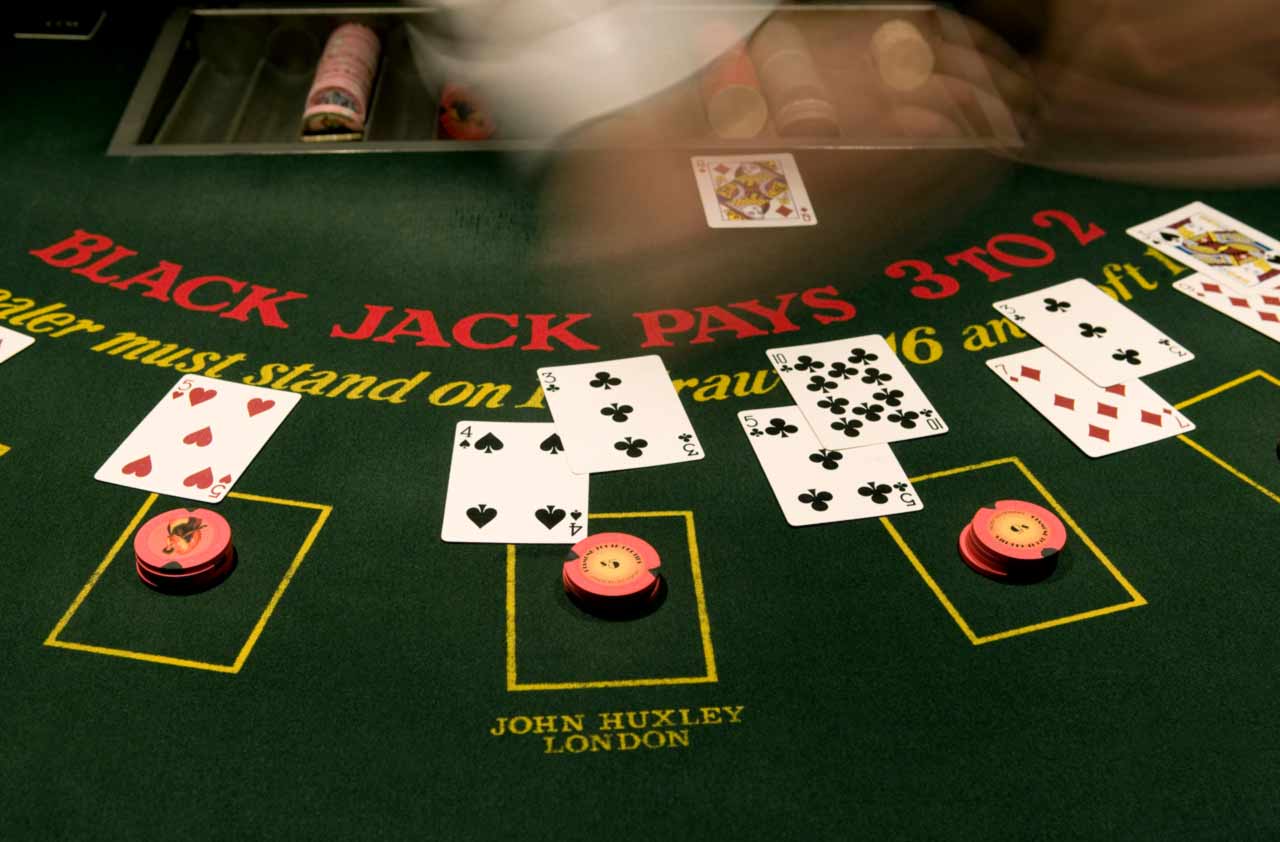Are You a Gambler, Speculator, Investor or Risk Manager?
To avoid making big money mistakes, investors should take a moment to examine themselves and their motivations.


Profit and prosper with the best of Kiplinger's advice on investing, taxes, retirement, personal finance and much more. Delivered daily. Enter your email in the box and click Sign Me Up.
You are now subscribed
Your newsletter sign-up was successful
Want to add more newsletters?

Delivered daily
Kiplinger Today
Profit and prosper with the best of Kiplinger's advice on investing, taxes, retirement, personal finance and much more delivered daily. Smart money moves start here.

Sent five days a week
Kiplinger A Step Ahead
Get practical help to make better financial decisions in your everyday life, from spending to savings on top deals.

Delivered daily
Kiplinger Closing Bell
Get today's biggest financial and investing headlines delivered to your inbox every day the U.S. stock market is open.

Sent twice a week
Kiplinger Adviser Intel
Financial pros across the country share best practices and fresh tactics to preserve and grow your wealth.

Delivered weekly
Kiplinger Tax Tips
Trim your federal and state tax bills with practical tax-planning and tax-cutting strategies.

Sent twice a week
Kiplinger Retirement Tips
Your twice-a-week guide to planning and enjoying a financially secure and richly rewarding retirement

Sent bimonthly.
Kiplinger Adviser Angle
Insights for advisers, wealth managers and other financial professionals.

Sent twice a week
Kiplinger Investing Weekly
Your twice-a-week roundup of promising stocks, funds, companies and industries you should consider, ones you should avoid, and why.

Sent weekly for six weeks
Kiplinger Invest for Retirement
Your step-by-step six-part series on how to invest for retirement, from devising a successful strategy to exactly which investments to choose.
With today’s economic uncertainty and market volatility, it’s important to understand the emotions that drive your investing decisions. Whether it’s greed, fear, optimism or something else, knowing what motivates you can help you avoid making mistakes.
Or, as Warren Buffett puts it, “Only when you combine sound intellect with emotional discipline do you get rational behavior.”
It takes all types to make the market run, but some approaches are more likely to lead to long-term success than others. Ask yourself which of these mindsets is most like yours:
From just $107.88 $24.99 for Kiplinger Personal Finance
Become a smarter, better informed investor. Subscribe from just $107.88 $24.99, plus get up to 4 Special Issues

Sign up for Kiplinger’s Free Newsletters
Profit and prosper with the best of expert advice on investing, taxes, retirement, personal finance and more - straight to your e-mail.
Profit and prosper with the best of expert advice - straight to your e-mail.
The Gambler
The gambler is usually looking to get rich quick or with little effort. For example, the odds of winning the grand prize in Powerball are 1 in 292,201,338; there’s no mathematical justification for buying a ticket. And yet, somebody’s going to win — and it could be you. So you play. That’s gambling.
In the world of options trading, most people are gamblers. Hoping that one big win will change their standard of living, they tend to put too much of their net worth behind their trades. They don’t pay attention to probability, and they don’t work out the odds.
If you gamble in the stock market, you might get lucky once in a while, but in the end, there’s a strong risk of losing.
The Speculator
Speculating involves taking a calculated risk with an uncertain outcome. It can be fine now and then, in the same way that going to a casino might be fun once in a while. But if it starts to consume you and you’re spending money that you can’t afford to lose, then it becomes a problem. You should thoroughly understand what you’re getting into and be prepared to lose all the money invested.
For most people, most of the time, that means speculating is inappropriate. Mark Twain says it this way: “There are two times in a man’s life when he should not speculate: when he can’t afford it, and when he can.”
The Investor
Investing is, of course, very different from gambling or speculating. It involves a process: learning fundamentals, doing some research and having confidence in a company’s financial details.
A careful investor makes decisions based on sound information, not hope or emotion.
Here’s another Buffett quote: In 2006, he told shareholders, “You have to be able to play out your hand under all circumstances. But if you can play out your hand, and you’ve got the right facts, and you reason by yourself, and you let the market serve you and not instruct you, you can't miss.”
That means a smart investor doesn’t just look at a price and say, “OK, that must be what the company is worth.” He estimates the actual value of the company based on his research, or the research of a trusted financial professional.
Investing does involve risk, including the potential loss of principal, since no strategy can guarantee a profit, and few protect against loss in periods of declining values. The key is to not get emotionally involved. An investor asks, “Can I make a good decision today to buy this asset based on sound information?” If the answer is yes, he moves forward.
The Risk Manager
As a person approaches or enters retirement, his thinking has to shift. Accumulating assets is no longer the goal; converting assets to income is what’s important.
Risk tolerance should be a factor for investors of all ages, but for those in or near retirement, it must be a primary focus. With little or no time to recover, a large loss can destroy your nest egg.
The risk manager thinks about what can be controlled in retirement ‐ and that’s certainly not the markets. It’s a matter of what portion of retirement assets should be in market-based assets (stocks, bonds, mutual funds, etc.) and how much should be in alternative assets (indexed annuities, real estate, commodities, etc.). Volatility is the enemy; diversification is the risk manager’s friend.
Did you spot yourself in any of the above investment approaches? Maybe you’re a mix of two or three, or even all four.
The trick is to be self-aware whenever you’re making a money move. Ask yourself each time, “Am I being a gambler, a speculator, an investor or a risk manager?” You just might save yourself from making a retirement-wrecking mistake.
Kim Franke-Folstad contributed to this article.
Profit and prosper with the best of Kiplinger's advice on investing, taxes, retirement, personal finance and much more. Delivered daily. Enter your email in the box and click Sign Me Up.

David Braun is an Investment Adviser Representative and Insurance Professional at David Braun Financial & Insurance Services Inc. Braun has more than 25 years of experience in the financial industry, and holds Chartered Financial Consultant (ChFC), Certified Life Underwriter (CLU) and Life Underwriter Training Council Fellow (LUTCF) industry designations. Investment advisory services are offered through Resility Financial Inc., a Registered Investment Adviser. Insurance services are provided through David Braun Financial & Insurance Services Inc. CA #0678292
-
 How to Turn Your 401(k) Into A Real Estate Empire
How to Turn Your 401(k) Into A Real Estate EmpireTapping your 401(k) to purchase investment properties is risky, but it could deliver valuable rental income in your golden years.
-
 My First $1 Million: Retired Nuclear Plant Supervisor, 68
My First $1 Million: Retired Nuclear Plant Supervisor, 68Ever wonder how someone who's made a million dollars or more did it? Kiplinger's My First $1 Million series uncovers the answers.
-
 How to Position Investments to Minimize Taxes for Your Heirs
How to Position Investments to Minimize Taxes for Your HeirsTo minimize your heirs' tax burden, focus on aligning your investment account types and assets with your estate plan, and pay attention to the impact of RMDs.
-
 Don't Bury Your Kids in Taxes: How to Position Your Investments to Help Create More Wealth for Them
Don't Bury Your Kids in Taxes: How to Position Your Investments to Help Create More Wealth for ThemTo minimize your heirs' tax burden, focus on aligning your investment account types and assets with your estate plan, and pay attention to the impact of RMDs.
-
 Are You 'Too Old' to Benefit From an Annuity?
Are You 'Too Old' to Benefit From an Annuity?Probably not, even if you're in your 70s or 80s, but it depends on your circumstances and the kind of annuity you're considering.
-
 In Your 50s and Seeing Retirement in the Distance? What You Do Now Can Make a Significant Impact
In Your 50s and Seeing Retirement in the Distance? What You Do Now Can Make a Significant ImpactThis is the perfect time to assess whether your retirement planning is on track and determine what steps you need to take if it's not.
-
 Your Retirement Isn't Set in Stone, But It Can Be a Work of Art
Your Retirement Isn't Set in Stone, But It Can Be a Work of ArtSetting and forgetting your retirement plan will make it hard to cope with life's challenges. Instead, consider redrawing and refining your plan as you go.
-
 The Bear Market Protocol: 3 Strategies to Consider in a Down Market
The Bear Market Protocol: 3 Strategies to Consider in a Down MarketThe Bear Market Protocol: 3 Strategies for a Down Market From buying the dip to strategic Roth conversions, there are several ways to use a bear market to your advantage — once you get over the fear factor.
-
 For the 2% Club, the Guardrails Approach and the 4% Rule Do Not Work: Here's What Works Instead
For the 2% Club, the Guardrails Approach and the 4% Rule Do Not Work: Here's What Works InsteadFor retirees with a pension, traditional withdrawal rules could be too restrictive. You need a tailored income plan that is much more flexible and realistic.
-
 Retiring Next Year? Now Is the Time to Start Designing What Your Retirement Will Look Like
Retiring Next Year? Now Is the Time to Start Designing What Your Retirement Will Look LikeThis is when you should be shifting your focus from growing your portfolio to designing an income and tax strategy that aligns your resources with your purpose.
-
 I'm a Financial Planner: This Layered Approach for Your Retirement Money Can Help Lower Your Stress
I'm a Financial Planner: This Layered Approach for Your Retirement Money Can Help Lower Your StressTo be confident about retirement, consider building a safety net by dividing assets into distinct layers and establishing a regular review process. Here's how.